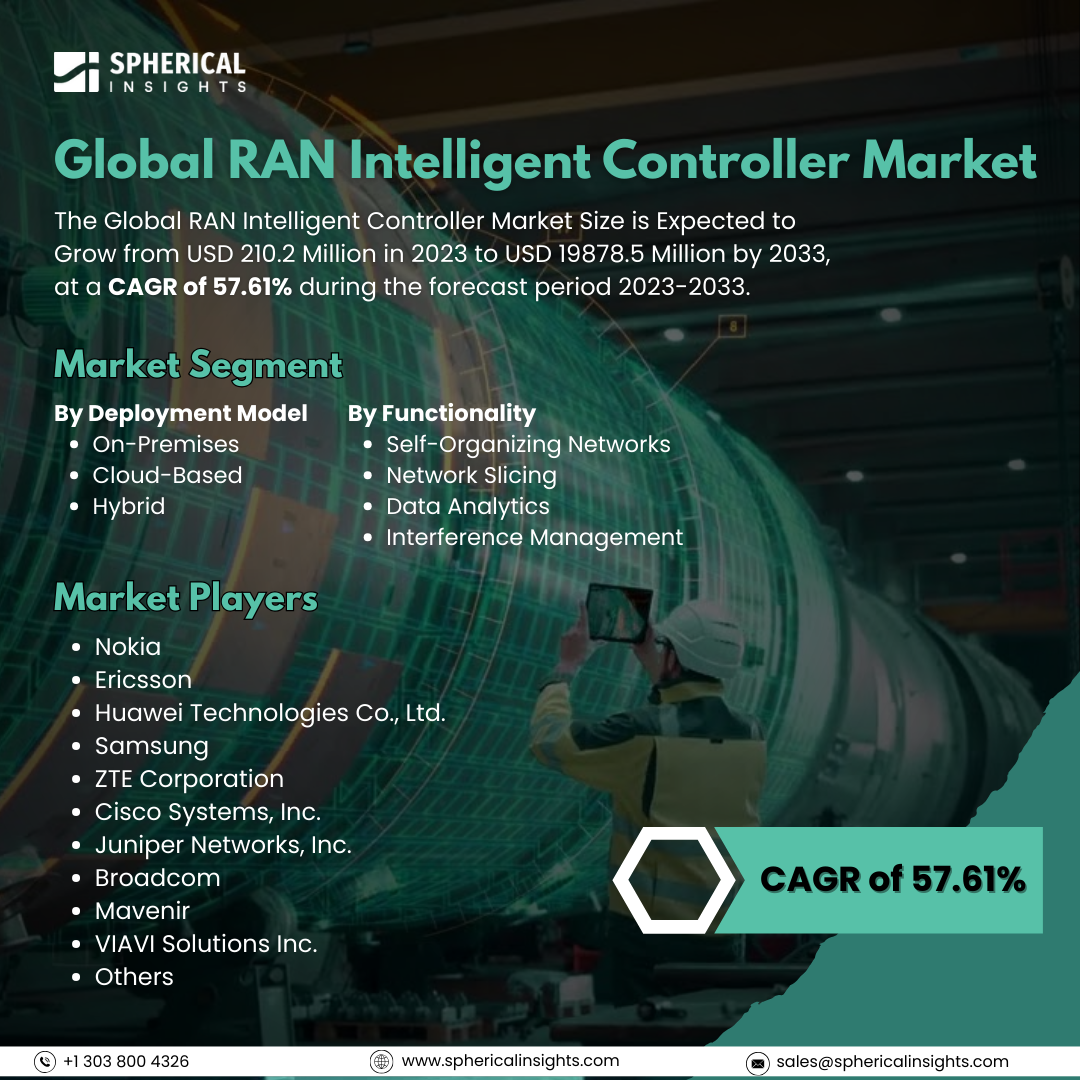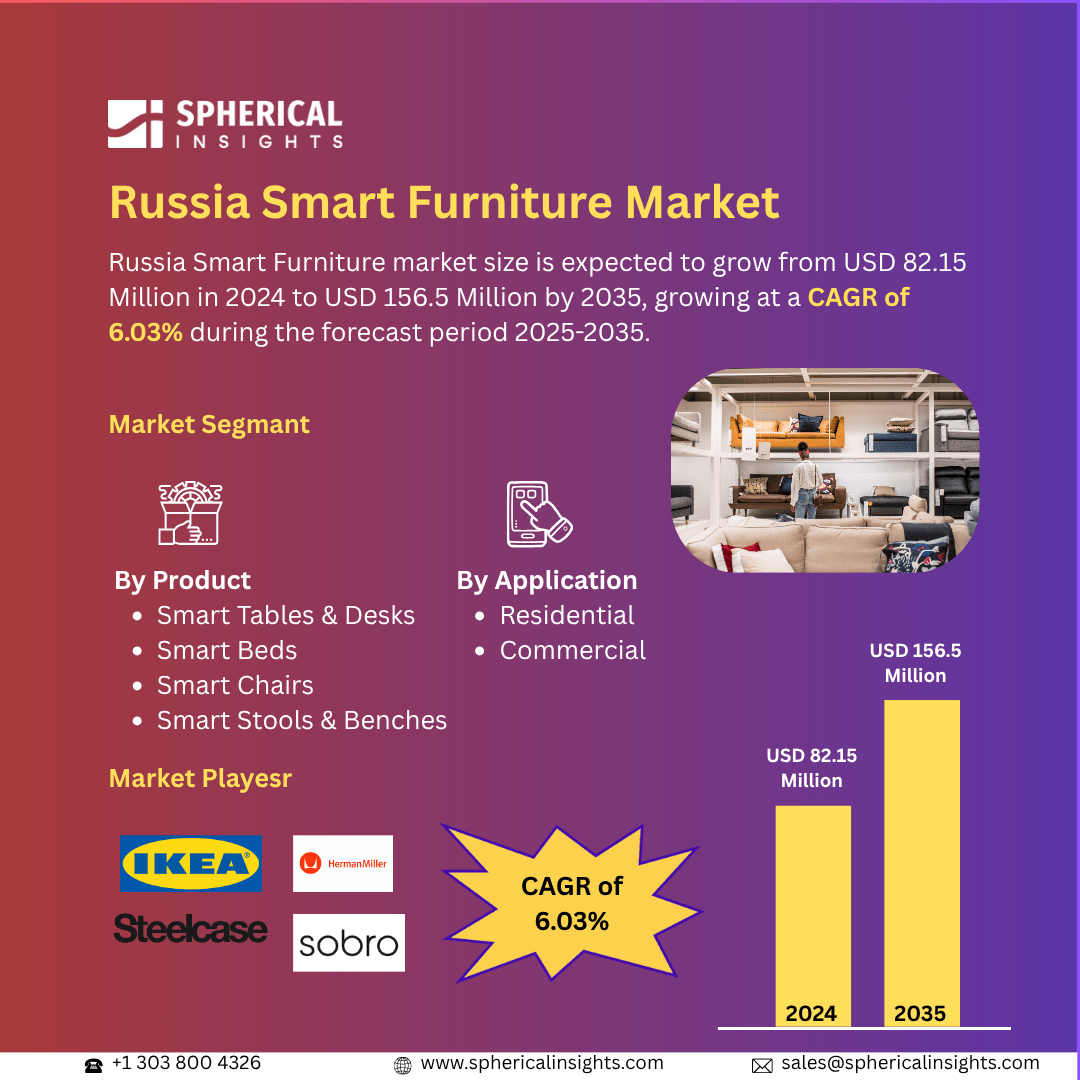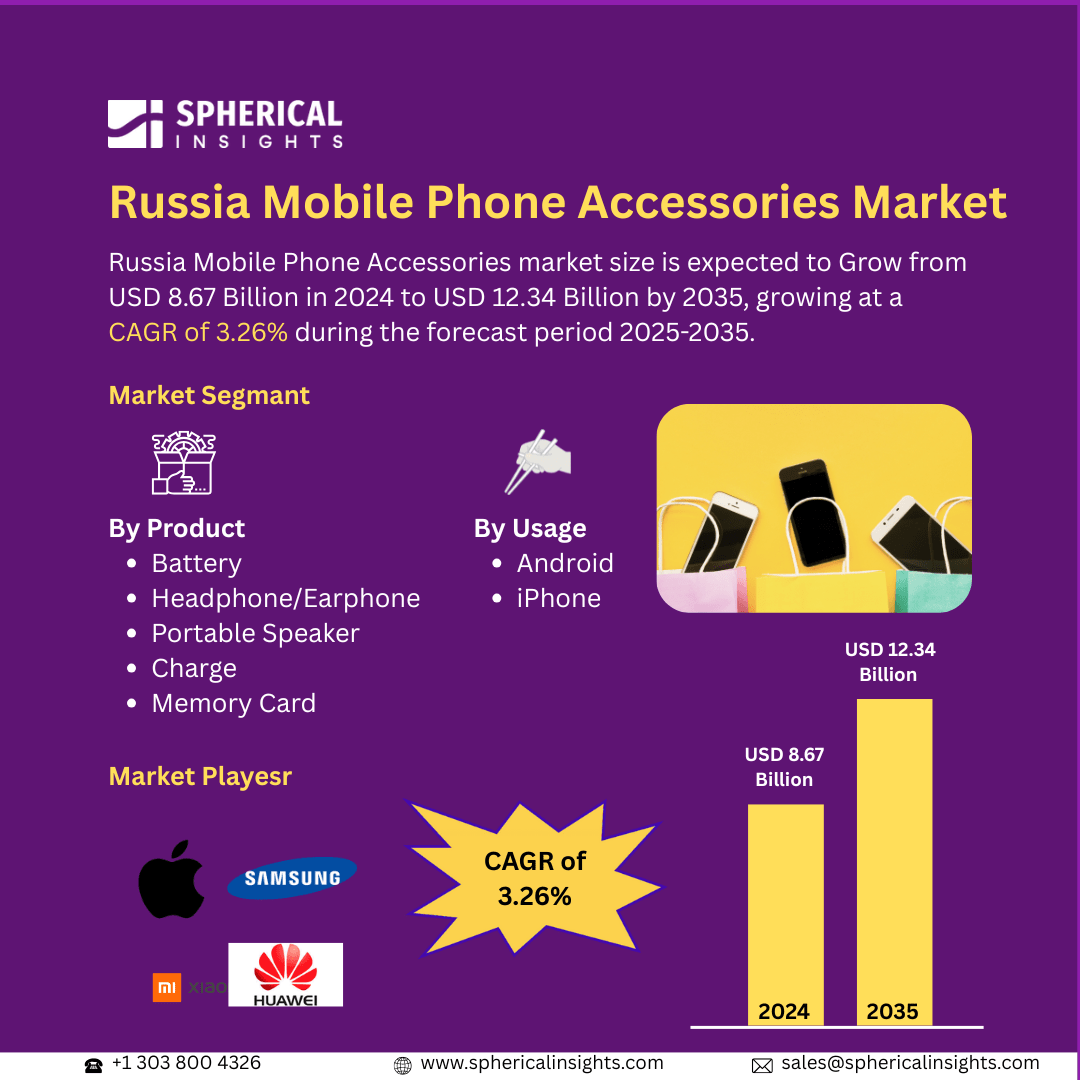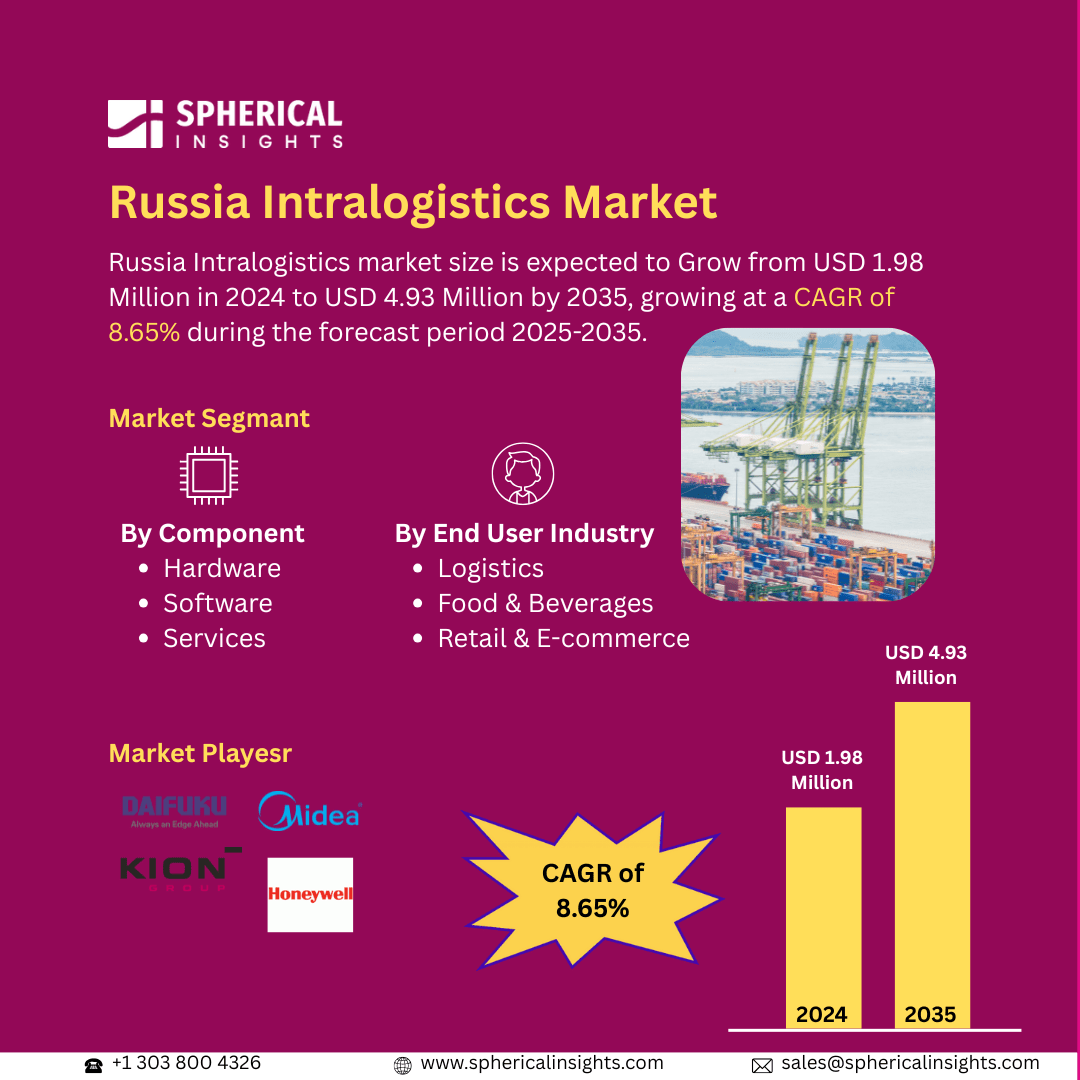Global RAN Intelligent Controller Market Size to Exceed 19878.5 Million by 2033
According to a research report published by Spherical Insights & Consulting, The Global RAN Intelligent Controller Market Size is Expected to Grow from USD 210.2 Million in 2023 to USD 19878.5 Million by 2033, at a CAGR of 57.61% during the forecast period 2023-2033.
Browse 210 market data Tables and 45 Figures spread through 190 Pages and in-depth TOC on the Global RAN Intelligent Controller Market Size, Share, and COVID-19 Impact Analysis, By Deployment Model (On-Premises, Cloud-Based, Hybrid), By Functionality (Self-Organizing Networks, Network Slicing, Data Analytics, Interference Management), By Application (Network Automation, Traffic Management, Resource Allocation, Quality of Service Management), and By Region (North America, Europe, Asia Pacific, Latin America, Middle East, and Africa), Analysis and Forecast 2023 – 2033
The RAN Intelligent Controller (RIC) market is the sector involved in optimizing and automating Radio Access Networks (RANs) based on artificial intelligence (AI) and machine learning (ML) solutions. RIC facilitates dynamic resource management, network efficiency improvement, and open and virtualized RAN (Open RAN, vRAN) architectures support. Moreover, the RAN intelligent controller (RIC) market is fueled by the fast rollout of 5G networks, rising mobile data traffic, and the use of Open RAN and virtualized RAN (vRAN) architectures. AI and ML-driven automation enhances network efficiency, lowers operational expenses, and optimizes real-time decision-making while expanding demand for network slicing and edge computing to further drive market growth. However, the RAN intelligent controller (RIC) market is hampered by factors including high costs of implementation, integration issues with existing networks, security of data, absence of standardization, and complexity of AI-based network optimization in real-time.
The cloud-based segment accounted for the largest share of the global RAN intelligent controller market in 2023 and is anticipated to grow at a significant CAGR during the forecast period.
Based on the deployment model, the global RAN intelligent controller market is divided into on-premises, cloud-based, and hybrid. Among these, the cloud-based segment accounted for the largest share of the global RAN intelligent controller market in 2023 and is anticipated to grow at a significant CAGR during the forecast period. This is owing to its scalability, flexibility, and cost-effectiveness. Telecommunication operators increasingly turn to cloud-based RIC solutions to facilitate real-time network optimization, AI-enabled automation, and smooth integration with Open RAN and 5G networks, minimizing dependence on legacy infrastructure.
The self-organizing networks segment accounted for a substantial share of the global RAN intelligent controller market in 2023 and is anticipated to grow at a rapid pace during the projected period.
On the basis of the functionality, the global RAN intelligent controller market is divided into self-organizing networks, network slicing, data analytics, and interference management. Among these, the self-organizing networks segment accounted for a substantial share of the global RAN intelligent controller market in 2023 and is anticipated to grow at a rapid pace during the projected period. This is because it can automate network configuration, optimize performance, and lower operational expenses. SON improves 5G and Open RAN deployments by allowing real-time optimization, reducing human intervention, and enhancing overall network efficiency and reliability.
The network automation segment accounted for the largest share of the global RAN intelligent controller market in 2023 and is anticipated to grow at a significant CAGR during the forecast period.
On the basis of application, the global RAN intelligent controller market is divided into network automation, traffic management, resource allocation, and quality of service management. Among these, the network automation segment accounted for the largest share of the global RAN intelligent controller market in 2023 and is anticipated to grow at a significant CAGR during the forecast period. This is because of its capability to maximize network performance, minimize operational expenses, and maximize efficiency. As 5G and Open RAN rollouts accelerate, telecom operators place high importance on automation in order to support real-time decision-making, AI-optimized decision-making, and automated network orchestration.
North America is projected to hold the largest share of the global RAN intelligent controller market over the projected period.
North America is projected to hold the largest share of the global RAN intelligent controller market over the projected period. This is because of the early take-up of 5G, high concentration of telecom behemoths, and investment in Open RAN technologies. The U.S. is at the forefront of the region with AI-powered network automation, cloud-based RIC deployments, and government backing for advanced wireless infrastructure and next-generation mobile networks.
Asia Pacific is expected to grow at the fastest CAGR of the global RAN intelligent controller market during the projected period. This is led by accelerated 5G rollout, growing mobile data usage, and government endorsements for Open RAN deployment. China, Japan, South Korea, and India are heavily investing in AI-powered network automation, cloud-based telecom infrastructure, and enhanced wireless technologies, fueling regional market growth.
Company Profiling
Major vendors in the global RAN intelligent controller market are Nokia, Ericsson, Huawei Technologies Co., Ltd., Samsung, ZTE Corporation, Cisco Systems, Inc., Juniper Networks, Inc., Broadcom, Mavenir, VIAVI Solutions Inc., and Others.
Key Target Audience
- Market Players
- Investors
- End-users
- Government Authorities
- Consulting and Research Firm
- Venture capitalists
- Value-Added Resellers (VARs)
Recent Development
- In April 2023, Telefonaktiebolaget LM Ericsson launched two new O-RAN automation applications (rApps) that would enable communications service providers to make their operations more energy-efficient and boost network performance. The recently launched apps, RAN Energy Cockpit and Ericsson RAN Energy Control would support telcos on their journey of intelligent automation with a focus on energy efficiency. The apps assert that these would allow users to lower their network energy consumption by as much as 25%.
Market Segment
This study forecasts revenue at global, regional, and country levels from 2023 to 2033. Spherical Insights has segmented the global RAN intelligent controller market based on the below-mentioned segments:
Global RAN Intelligent Controller Market, By Deployment Model
- On-Premises
- Cloud-Based
- Hybrid
Global RAN Intelligent Controller Market, By Functionality
- Self-Organizing Networks
- Network Slicing
- Data Analytics
- Interference Management
Global RAN Intelligent Controller Market, By Application
- Network Automation
- Traffic Management
- Resource Allocation
- Quality of Service Management
Global RAN Intelligent Controller Market, By Regional
- North America
- Europe
- Germany
- UK
- France
- Italy
- Spain
- Russia
- Rest of Europe
- Asia Pacific
- China
- Japan
- India
- South Korea
- Australia
- Rest of Asia Pacific
- South America
- Brazil
- Argentina
- Rest of South America
- Middle East & Africa
- UAE
- Saudi Arabia
- Qatar
- South Africa
- Rest of the Middle East & Africa



